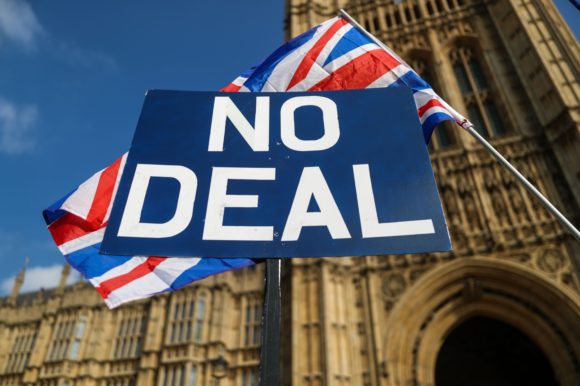Brexit from afar is looking like a disaster about to happen. One European official, watching the situation up close, compared it to two cars driving at high speed toward each other with each expecting the other to swerve out of the way first.
The brinkmanship surrounding the U.K.’s departure from the European Union has been compared to a game of chicken before now. Trust is in short supply, and there’s a sinking feeling that the desire to get a deal done to avert the potential economic catastrophe of a no deal is evaporating.
Conversations with officials on the either side of the negotiating table paint a grim picture of the state of play as an Oct. 31 deadline looms. Across EU capitals, the question asked is if Prime Minister Boris Johnson has a plan up his sleeve and if so — when can they see it.
Will they have to wait for a crunch summit less than two weeks before the crash-out scenario? At a meeting in Paris, French President Emmanuel Macron and Finnish Prime Minister Antti Rinne, agreed the U.K. must present a written proposal for a deal by Sept. 30.
These deadlines are largely meaningless — more a way of trying to exert pressure on the U.K. that under Johnson seems largely impervious to it. His predecessor, Theresa May, buckled at various points and asked for extensions.
No Delay
But pushing back departure beyond Oct. 31 is a red line for a more combative leader who has framed success around just getting Brexit done. The political cost of backing down and compromising keeps getting higher — on all sides — and that makes it hard to see a way out even as talks are ostensibly ongoing.
And while kicking the ball down the road is how many crises are dealt with in Brussels, more than two years of negotiations that keep going around in circles have taken its toll. Brexit fatigue is a thing not just with voters. Europe also wants to move on.
Officials say reaching a successful conclusion is a long shot, and there is evidence of bad blood. Luxembourg’s Xavier Bettel vented at a news conference about his frustration with the “nightmare” Brexit process, a view probably many leaders share behind closed doors. He may have been grandstanding, but he showed how patience is running out.
While officials in Berlin, Paris and Dublin have revised their earlier assumptions that Johnson doesn’t want a deal, they don’t believe he knows how to get there. Over in London, a senior U.K. official said there isn’t much sign the EU is prepared to give Johnson what he needs.
“The risk of no deal is very real,” European Commission President Jean-Claude Juncker told the European Parliament in Strasbourg, France on Wednesday in comments that sent the pound falling. And while a deal is preferable, he’s “not sure we will get there.”
The sticking point remains the backstop — a series of measures the EU says is needed to prevent the return of customs infrastructure on the Irish border. In its existing form it would keep the whole of the U.K. in a customs union with the bloc until a future trade deal solved the border problem.
The EU is willing to adapt that to apply to Northern Ireland only, leaving the rest of the U.K. to diverge from European rules, but the government has said that isn’t acceptable either.
Despite tough talking in public, Johnson’s envoy to the EU and European Commission negotiators have discussed possible solutions, although the U.K. hasn’t presented anything on paper. This is a deliberate attempt by the British side to prevent ideas becoming public only then to be immediately rejected, according to U.K. officials.
While the EU is frustrated by this, it does understand the strategy and was always expecting British proposals closer to the EU summit scheduled for Oct. 17-18, one official said.
The German government, for its part, hasn’t thrown in the towel. “I’ll say again now, just as I said during Boris Johnson’s visit, that I continue to see the possibility of an orderly exit,” Chancellor Angela Merkel told reporters in Berlin.
The EU is keeping a close eye on U.K. domestic politics, too, which have shaped so much of the trajectory of negotiations. Parliament’s victory in forcing Johnson to seek a Brexit delay — if he hasn’t got a deal after next month’s summit — is part of their calculus on when compromise might happen.
Ireland, which of all the EU economies has the most to lose if the U.K. leaves without a deal, doesn’t see a reason to compromise until the legal battle in London plays out. It’s still waiting to see if Johnson will indeed defy the law as he’s said he’s prepared to.
Irish Prime Minister Leo Varadkar, like Johnson himself, is on an election footing. Caving in to the U.K. would risk being seen as a sign of weakness. It’s far from clear which, if either, leader will give way.
–With assistance from Thomas Penny, Dara Doyle, Patrick Donahue, Gregory Viscusi, Kati Pohjanpalo and Paul Tugwell.
Related:
Topics Europe
Was this article valuable?
Here are more articles you may enjoy.



 Portugal Deadly Floods Force Evacuations, Collapse Main Highway
Portugal Deadly Floods Force Evacuations, Collapse Main Highway  Florida’s Commercial Clearinghouse Bill Stirring Up Concerns for Brokers, Regulators
Florida’s Commercial Clearinghouse Bill Stirring Up Concerns for Brokers, Regulators  Trump’s Repeal of Climate Rule Opens a ‘New Front’ for Litigation
Trump’s Repeal of Climate Rule Opens a ‘New Front’ for Litigation  Fingerprints, Background Checks for Florida Insurance Execs, Directors, Stockholders?
Fingerprints, Background Checks for Florida Insurance Execs, Directors, Stockholders? 

